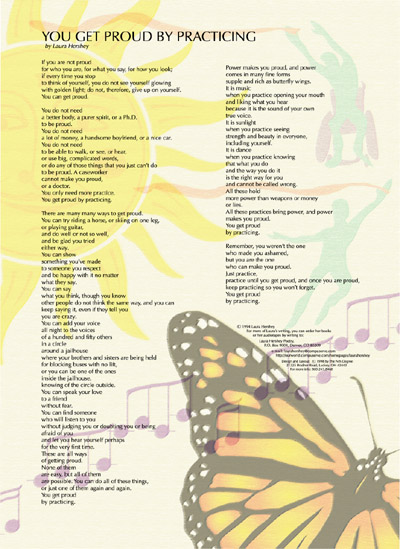In honor of LGBT Pride Month — and to honor and encourage all kinds of people embracing the risks of visibility and pride — I decided to re-post a very old poem of mine. It remains a favorite of mine, and of lots of other people. It’s been reprinted in a number of places, most recently in an anthology called Fire in the Soul: 100 Poems for Human Rights. It speaks of the right to feel proud, and offers some exercises for achieving pride.
YOU GET PROUD BY PRACTICING
Copyright 1991 by Laura Hershey
If you are not proud
for who you are, for what you say, for how you look;
if every time you stop
to think of yourself, you do not see yourself glowing
with golden light; do not, therefore, give up on yourself.
You can
get proud.
You do not need
a better body, a purer spirit, or a Ph.D.
to be proud.
You do not need
a lot of money, a handsome boyfriend, or a nice car.
You do not need
to be able to walk, or see, or hear,
or use big, complicated words,
or do any of the things that you just can’t do
to be proud. A caseworker
cannot make you proud,
or a doctor.
You only need
more practice.
You get proud
by practicing.
There are many many ways to get proud.
You can try riding a horse, or skiing on one leg,
or playing guitar,
and do well or not so well,
and be glad you tried
either way.
You can show
something you’ve made
to someone you respect
and be happy with it no matter
what they say.
You can say
what you think, though you know
other people do not think the same way, and you can
keep saying it, even if they tell you
you are crazy.
You can add your voice
all night to the voices
of a hundred and fifty others
in a circle
around a jailhouse
where your brothers and sisters are being held
for blocking buses with no lift,
or you can be one of the ones
inside the jailhouse,
knowing of the circle outside.
You can speak your love
to a friend
without fear.
You can find someone
who will listen to you
without judging you or doubting you or being
afraid of you
and let you hear yourself perhaps
for the first time.
These are all ways
of getting proud.
None of them
are easy, but all of them
are possible. You can do all of these things,
or just one of them again and again.
You get proud
by practicing.
Power makes you proud, and power
comes in many fine forms
supple and rich as butterfly wings.
It is music
when you practice opening your mouth
and liking what you hear
because it is the sound of your own
true voice.
It is sunlight
when you practice seeing
strength and beauty in everyone
including yourself.
It is dance
when you practice knowing
that what you do
and the way you do it
is the right way for you
and can’t be called wrong.
All these hold
more power than weapons or money
or lies.
All these practices bring power, and power
makes you proud.
You get proud
by practicing.
Remember, you weren’t the one
who made you ashamed,
but you are the one
who can make you proud.
Just practice,
practice until you get proud, and once you are proud,
keep practicing so you won’t forget.
You get proud
by practicing.
By the way, if you would like to order a poetry chapbooks, audiotapes, or poster featuring this poem, “You Get Proud By Practicing,” you can email Laura at contact@laurahershey.com
